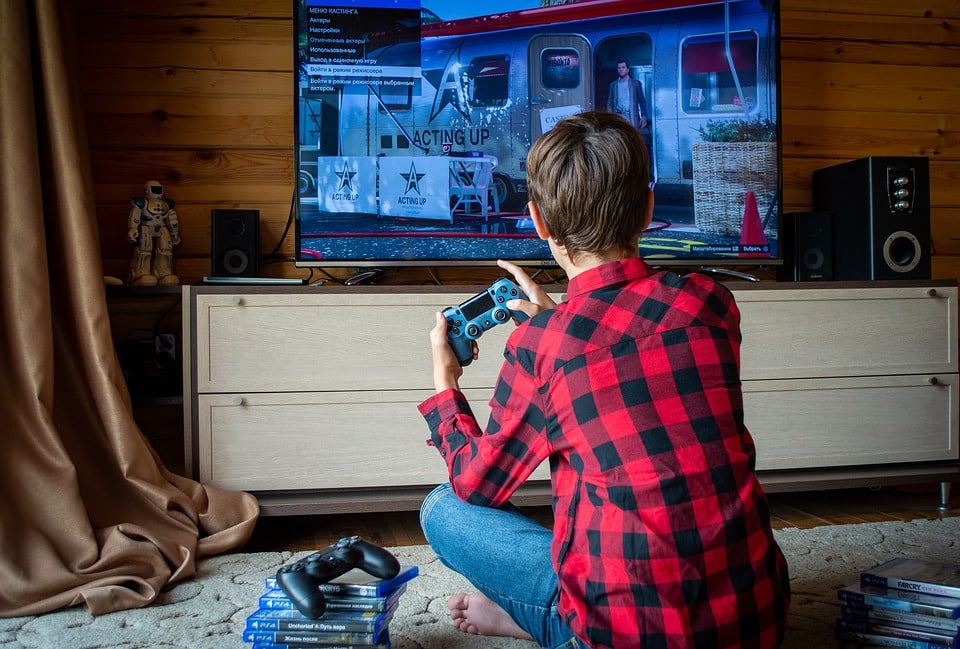As a parent raising 3 children and wanting all good things for them, I wish someone told me sooner about the effects of gaming on children.
After a long time of self-experience, I figure out that almost all of the children above 5 can play at least one video game and the rise in the popularity of video games has led to a significant increase in children experiencing the potential effects of games.
It would be so bad if our children forever love playing games and pay no attention to everything around them.
In this article, we will go over the positive and negative effects of Gaming on Children and how we can help parents monitor children’s game habits.
Positive Effects of Gaming on Children

Contrary to popular belief, playing games can bring some benefits to your child.
Cognitive benefits of gaming:
Video gaming can enhance multiple cognitive skills such as improving problem-solving skills and spatial reasoning.
Research has shown that children may have a better allocation of attention, visual processing, and good memory. The positive effects of gaming include improvement in a player’s capability of thinking in different dimensions.
Social benefits of gaming:
By playing with their friends, your child will be able to increase communication and teamwork skills. From that, they can develop their social ability which is good for their future career path.
Emotional benefits of gaming:
There’s no denying that games are highly entertaining. It can help release stress after long hours of hard studying. Playing games bring instant happiness or relaxation and mood improvement.
By playing games over time, children may develop positive thoughts to help them become more secure and self-confident.
However, you need to be aware of the harmful effects of games.
Negative Effects of Gaming on Children
Excessive use of games will have many negative effects on Children:

Physical effects:
- Eye strain: Looking at the screen for a long time will harm the child’s eyesight in the long run.
- Poor posture: constant sitting with a fixed posture will affect body shape in the future.
- Affect overall health: when your child spends most of their time in games, it is easy to forget to eat regular milk, drink water, and exercise… it’s also not good for sleep hygiene and then the overall health will go down. More seriously, it may lead to obesity, heart disease…
Behavioral effects:
- Increased aggression: Playing video games can lead to aggression in behavior. After excess use and gaming addiction, your child can feel aggressive and more violent.
- Decrease academic performance: the price of spending too much time on the game makes learning results decline because your child did not pay attention enough to study.
Psychological effects:
- Addiction to games: Your children spend hours and hours in games without the intention to stop. Their mind is full of different types of games, and they only think and talk about games. They cannot control the amount of time spent on games.
- Social isolation: Children do not want to discuss their gaming addiction with you. They become absent for hours and sit alone in their room. They may look unconcerned about their friends and family around them.
- Lack of motivation: when gaming becomes the only activity your brain finds pleasurable, a lack of motivation to join other activities is a natural outcome.
Parental Guidance for Gaming
Children love games partly the fault of their parents. Remember when your child is 2-3 years old because we want to have extra time for ourselves, we give the child our mobile phone.
In addition, game makers are genius directors. They immediately attract the child to conquer level after level.

What should we do in the digital game world?
Be your child’s leader:
Parents should be shining examples for their children to follow. If you do not want your child to play games or sit in front of a computer/mobile screen for long hours, do not do it yourself!
It is a better idea if parents read books, do some housework, and play sports…. instead of looking at the screen for entertainment. Your children might take your action/daily activities as good behavior for them to imitate.
Gradually, good behaviors transform into good habits…
Setting time limits for gaming:
Your children will not be self-disciplined with games if you do not set time limits for them.
It is a good idea to set passwords for your computer/phone so that children must get your approval before playing any game.
You should offer strict discipline to your children. For example: Only playing games AFTER finishing homework.
And the amount of time spent on gaming should be around 30 minutes or a maximum of 1 hour on weekends.
Choosing age-appropriate games
You may read online reviews about games that your children are allowed to play. In that way, you will understand the content of games and control games that are appropriate to their ages.
Monitoring children’s gaming habits
Children’s gaming habits can be monitored if you make the game time a reward: Children will play games as a reward dependent on completing or meeting a goal.
For example, you can allow your child to play games if he maintains his homework after you check it out, otherwise, he can only play on weekends. Or allow your child to play only when he or she has completed the task or getting a specific score in school.
Encouraging alternative activities

Another way to pull your children out of games is to ask them out for alternative activities like swimming, playing basketball, football, or riding a bicycle…
Those outdoor activities will help your children temporarily forget video games and are also good for their health.
Or you may encourage your children to do some new research in the school library. You give them topics to go for deeper study. When finishing, your children will get new knowledge for their life.
Conclusion
As parents, we certainly worry when our child plays games too much. Especially when children show signs of game addiction. Knowing the effects of gaming on children and how to have proper monitoring is a must in today’s digital world.
Parents play a very important role in helping children develop both mentally and physically. Therefore, parents need to accompany their children on their way to growth.
Finally, parents should be aware of which video games their children are playing and know when to intervene in their children’s gaming. Be there ready to talk and show understanding because sometimes your child may need your help.
FAQ
How much screen time from gaming is safe for children to have?
It’s good to set game time limits for children in order to avoid game addiction.
For children over the age of 6, the time limit for gaming is no more than 60 minutes on school days and 2 hours on non-school days. Children under 6 should spend closer to 30 minutes.
How can I help my child avoid addiction to gaming?
- Playing together and staying engaged, setting up healthy habits like going out, playing sports, or even shopping…
- Set a time limit for gaming
- Reduce the game time if you see any sign of game addiction
How do violent gaming impact children’s behavior and attitudes?
Little by little, violent gaming makes children more aggressive but not all children who play violent video games will develop bad behavior and attitudes.
How can I monitor and control my child’s gaming habits?
We should keep a closer eye on your child’s gaming habits. Consider purchasing monitoring software that will tell you what sites your children have visited in a given time range.
Another piece of advice is that you watch them play and talk to them about their actions. This will help you better understand their interests and habits, and you will be able to provide more guidance if needed.
How can I set boundaries for my child’s gaming habits?
Put in the rules, the limits on how much they can play at one time as well as the amount of time they can play in a day or a week. With an agreement outlined in advance and before the games come on, your child may follow easier.
ALSO READ: How to use Technology to Enhance Children’s Communication and Social Skills







